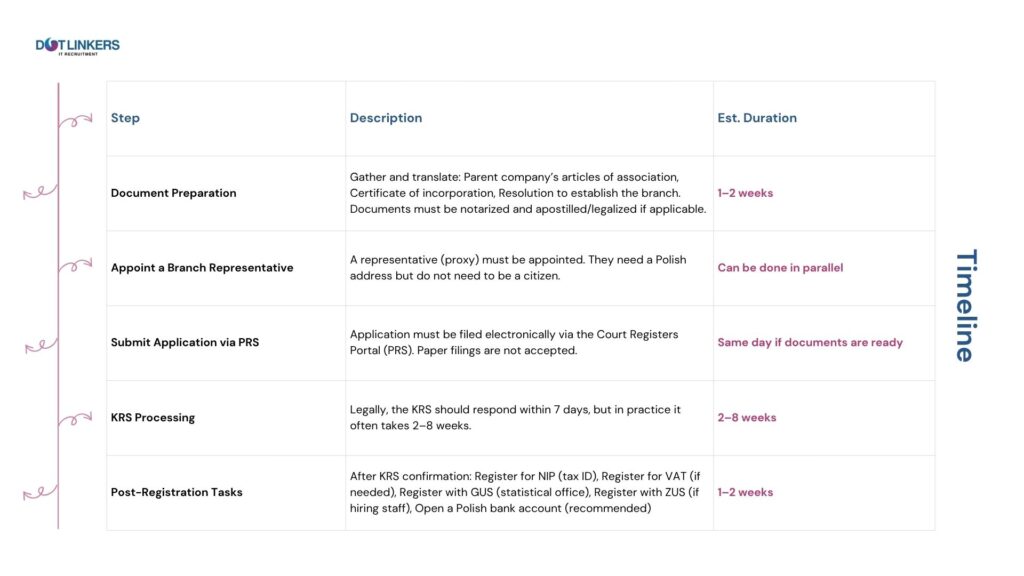Table of Contents
Opening an IT company branch in Poland usually takes between 2 weeks and 2 months from the submission of a complete application to the National Court Register (KRS). This timeframe covers the basic legal registration process, assuming that all documents are correct and complete and there are no delays due to formal deficiencies.
Key Steps and Considerations to Open IT Branch in Poland
Preparation of Documents
You must gather and translate (by a sworn translator) the parent company’s constitutional documents, such as the articles of association, certificate of incorporation, and a resolution to establish the branch. These documents must be notarized and, if applicable, apostilled or legalized.
Appointment of a Branch Representative
A person (proxy) must be appointed to represent the branch in Poland. This person does not need to be a Polish citizen, but must have a Polish address.
Electronic Registration
The application is submitted electronically via the Court Registers Portal (PRS). Paper applications are not accepted.
Court Processing: The KRS is required by law to process applications within 7 days, but in practice, it often takes several weeks to up to 2 months.
Post-Registration Steps
After KRS registration, you must:
- Register with the Tax Office for a tax identification number (NIP) and VAT, if applicable.
- Register with the Central Statistical Office.
- Register as an employer with the Social Insurance Institution (ZUS) if you plan to hire staff.
- Open a Polish bank account (recommended, though not strictly required).
Is it possible to start the recruitment process in Poland without formally establishing a company?
Yes, it is possible to start the recruitment process in Poland without formally setting up a company, thanks to a solution known as the Employer of Record (EoR).
An Employer of Record is an external entity that formally employs workers on behalf of a foreign company. This means that the EoR handles all employment-related formalities, such as signing employment contracts, processing payroll, paying social security contributions, taxes, and fulfilling other legal obligations under Polish labor law, while the actual day-to-day management of the employee remains with the client, i.e., the foreign company.
This solution is especially attractive for companies that:
- Want to quickly enter the Polish market without registering a legal entity and want to hire on perm contracts.
- Are testing the market or running a pilot project.
- Wish to hire remote professionals in Poland but are not ready to commit to the administrative and tax responsibilities of setting up a local branch.
In practice, using an EoR allows companies to begin recruitment almost immediately while remaining fully compliant with Polish labor regulations. Importantly, this is a legal and widely accepted approach, particularly in the IT and professional services sectors. However, it’s worth noting that many candidates in Poland prefer to work on a direct B2B contract with the end client. EoR solutions, while effective, involve more formalities on the candidate’s side and may raise concerns about being officially employed by a third-party entity rather than by the company they’ll actually be working for. Wherever possible, direct B2B engagement tends to be more attractive from the candidate’s perspective.
Check also: Why is worth opening a branch in Poland.


